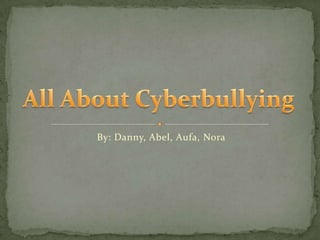Cyberbullying
- 1. By: Danny, Abel, Aufa, Nora
- 2. WHAT IS CYBERBULLYING? Cyberbully is when a child is tormented, threatened, harassed, humiliated, embarrassed or targeted by another child using the Internet, mobile phone, or other type of digital technology. It has to be a child on both sides. If it is an adult, it is not considered cyberbullying and is called cyber-harassment or cyberstalking and is a very serious crime. Cyberbullying is very serious also, but it doesn't always break the law. Sometimes it does break the law , and even when it doesn't, it is definitely wrong and children do usually get in trouble with parents or school.
- 4. Effects Of Cyberbullying ď‚— No longer limited to schoolyards or street corners, modern-day bullying can happen at home as well as at school. ď‚— Severe or chronic cyberbullying can leave victims at greater risk for anxiety, depression, and other stress- related disorders. ď‚— The punishment for cyber bullies can include being suspended from school or kicked off of sports teams. ď‚— Many of the victim of cyberbullying take a risk to end the tease of bullies by committed suicide.
- 5. Many kids and teens who are cyberbullied are reluctant to tell a teacher or parent, often because they feel ashamed of the social stigma, or because they fear their computer privileges will be taken away at home. The signs that a child is being cyberbullied vary, but a few things to look for are:  signs of emotional distress during or after using the Internet or the phone  being very protective or secretive of their digital life  withdrawal from friends and activities  avoidance of school or group gatherings  slipping grades and "acting out" in anger at home  changes in mood, behavior, sleep, or appetite
- 6. Finding out that your kid is the one who is behaving inappropriately can be upsetting and heartbreaking. It's important to address the problem head on and not wait for it to go away. Talk to your child firmly about his or her actions and explain the negative impact it has on others. Joking and teasing might seem OK, but it can hurt people's feelings and lead to getting in trouble. Bullying — in any form — is unacceptable; there can be serious (and sometimes irrevocable) consequences at home, school, and in the community if it continues.
- 7. Tips to Stop Cyberbullying • Don’t respond • Don’t retaliate • Save the evidence • Talk to a trusted adult • Block the bully • Be civil • Don’t be a bully • Be a friend, not a bystander
- 8. Thank you for watching our presentation… GOOD BYE








